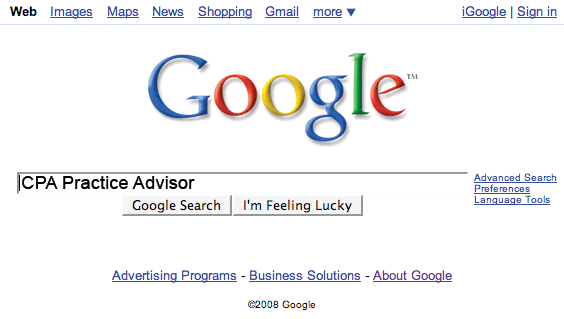Firm Management
How Local SEO is Important to Accounting Firms
Dec. 19, 2018

As the Internet and Google is ever-changing, so is the behavior of its users and their needs which are currently shifting from global to locally-oriented searches. Currently it’s estimated that 59% of Internet searches are now performed with local intent and approximately half of all mobile searches are conducted to find information about a local business including hours of operation or directions. Why is this important to accountants and CPAs? The answer is simple – local search matters and optimizing your website for it is key. Individuals/businesses are seeking businesses that are within their geographic area (city, town or state) to help them solve their tax, accounting and business issues. For most firms, they are not targeting a national audience and would prefer strong rankings with locally initially searches. Local SEO tactics can help move the needle on the firm’s efforts.
Four Ways that Google Displays Local Search Engine Results Page (SERPs)
- Keyword Only Searches – If a user searches for an accounting firm without including keywords such as a city name they are relying more heavily on traditional organic ranking factors for results which can be limiting. An example of such a search would be an Internet user in Dallas, Texas searching for an accounting firm. Instead of searching locally with the terms “Dallas Texas accounting firm”, their keywords would be “accounting firm”. These types of searches are shifting more and more to a locally focused list of results which means it’s important for your firm to make the necessary adjustments to be found more readily. Remember, Google wants to deliver the most relevant search results to the searcher and will use local results first.
- Keyword + Location Searches – As mentioned above, keyword searches that include important information such as a city name rely more heavily on true local ranking factors from Google. It’s likely that Google will list results that are pulled from local listings like Google My Business, Facebook, Yelp and other directories. An example of a keyword + local search could be “Charlotte North Carolina Forensic Accounting”. In this example, the searcher is clearly stating where they want search results to be focused on. It’s essential to ensure your website is optimizing for service and industry terms combined with geographic terms.
- “Near Me” Searches – Near Me searches are gaining popularity on Google and are no longer just about finding a specific place. They’re about finding a specific service/product, in a specific location, within a specific timeframe. An example of Google wanting to filter local search results is the following: a user will type a phrase in Google assuming it’s local and Google will suggest the addition of “Near Me”. When the user accepts, Google returns local search results based on the user’s physical location. An example of this type of search would be the search for “bookkeeper”. Google suggests adding near me to it and the search now becomes “bookkeeper near me”.
- Mobile Based Searches – Many are surprised to learn that searches on a mobile device can yield very different results than the same searches conducted on a desktop computer. Why? Google can determine the device you are using and delivers results that are best suited for it. So, if a website is not mobile friendly, or has other issues, it will be ignored when a search is conducted on a mobile device. Since the number of mobile searches are increasing it’s important to ensure your website is optimized with local SEO. In addition, make sure the mobile version of your website is meeting Google best practices.
In Perspective
If you want to see how your firm is doing with its local SEO, then I suggest visiting the free Moz Check My Listing Tool. It will analyze all your listings and other information to give you a sense of where you stand. It’s a great tool and a useful way to gain a baseline understanding of where the firm’s website stands.
=====
Brian Swanson is the Chief SEO Strategist at FlashPoint Marketing, where he helps accounting firms optimize their online strategy. www.flashpointmarketing.biz. You can also follow him on twitter @bswan775.
